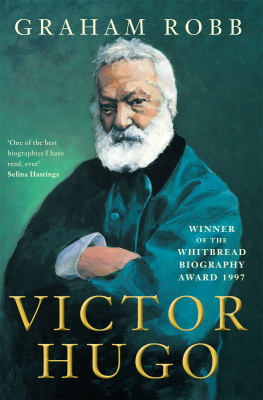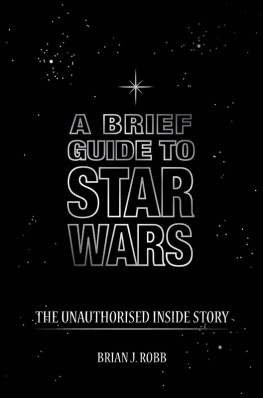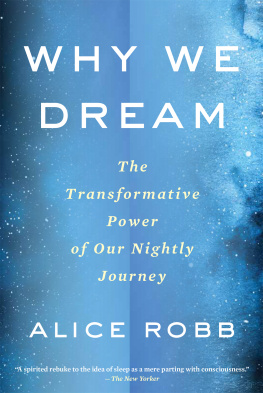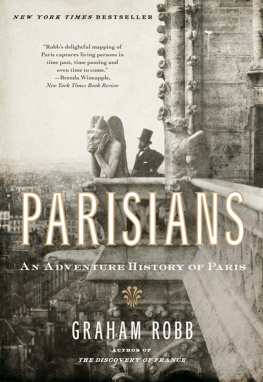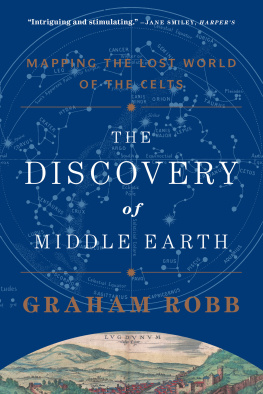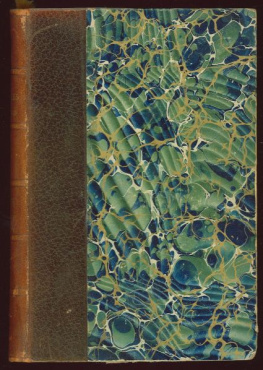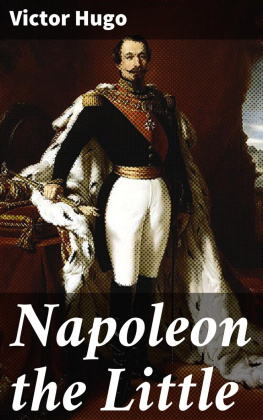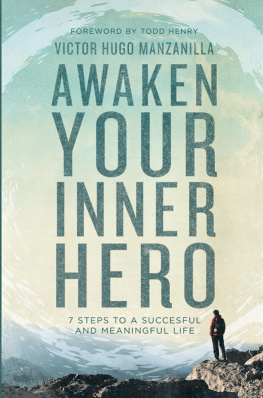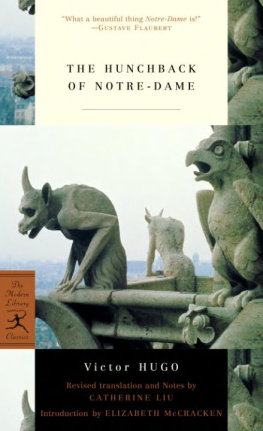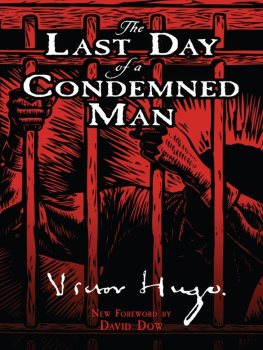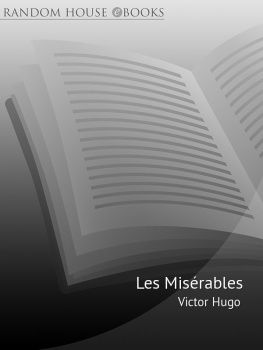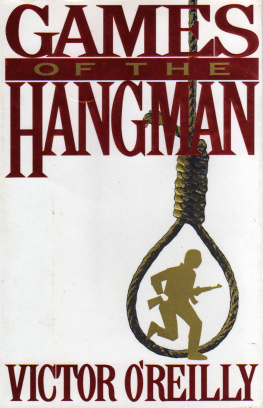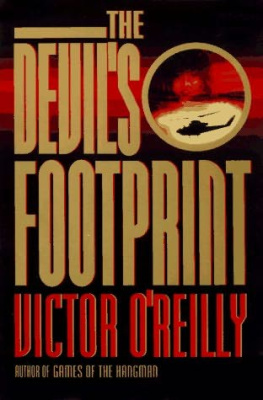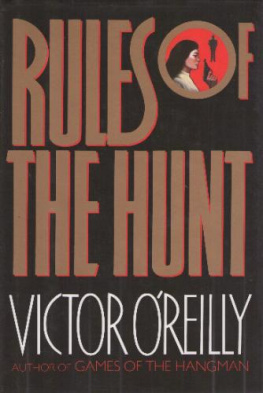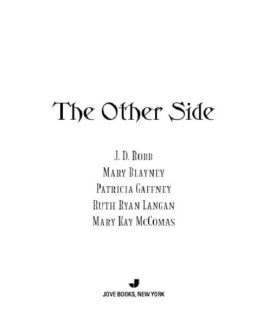Robb - Victor Hugo
Here you can read online Robb - Victor Hugo full text of the book (entire story) in english for free. Download pdf and epub, get meaning, cover and reviews about this ebook. publisher: Macmillan Pub Ltd, genre: Non-fiction. Description of the work, (preface) as well as reviews are available. Best literature library LitArk.com created for fans of good reading and offers a wide selection of genres:
Romance novel
Science fiction
Adventure
Detective
Science
History
Home and family
Prose
Art
Politics
Computer
Non-fiction
Religion
Business
Children
Humor
Choose a favorite category and find really read worthwhile books. Enjoy immersion in the world of imagination, feel the emotions of the characters or learn something new for yourself, make an fascinating discovery.
- Book:Victor Hugo
- Author:
- Publisher:Macmillan Pub Ltd
- Genre:
- Rating:4 / 5
- Favourites:Add to favourites
- Your mark:
- 80
- 1
- 2
- 3
- 4
- 5
Victor Hugo: summary, description and annotation
We offer to read an annotation, description, summary or preface (depends on what the author of the book "Victor Hugo" wrote himself). If you haven't found the necessary information about the book — write in the comments, we will try to find it.
Victor Hugo — read online for free the complete book (whole text) full work
Below is the text of the book, divided by pages. System saving the place of the last page read, allows you to conveniently read the book "Victor Hugo" online for free, without having to search again every time where you left off. Put a bookmark, and you can go to the page where you finished reading at any time.
Font size:
Interval:
Bookmark:
Graham Robb
VICTOR HUGO
PICADOR
W HEREVER ONE LOOKS in the nineteenth century, there is a Victor Hugo each one accompanied by its contradiction: the angelic child prodigy of the early Romantics and the satanic Attila of the French language; the militant monarchist and the revolutionary socialist; the symbol of a corrupt aristocracy and defender of the misrables; a represser of revolts and instigator of riots.
By the time he fled the country in 1851, Hugo was the most famous living writer in the world, the founder of two distinct phases of Romanticism. His influence on French literature was second only to that of the Bible. In the long night of exile, faced with a new audience the ocean he discovered a new set of identities: the visionary poet who invented a religion and received personal compliments on his work from Jesus Christ and Shakespeare; the hero of freedom-fighters from Serbia to South America.
Hugo returned to Paris at the end of the Empire in 1870 as a gigantic oxymoron who seemed single-handedly to represent the history of France since the Revolution. When he died in 1885, he was followed to his tomb by a crowd which outnumbered the usual population of Paris. The obituaries turned out to be premature: it emerged that only two-thirds of Hugos work had been published in his lifetime. Seventeen years after his death, the corpus had swollen to include seven novels, eighteen volumes of poetry, twenty-one plays, a small museum of paintings and drawings, and approximately three million words of history, criticism, travel writing and philosophy. Now that the fragments of Ocan and the coded diaries have been published, Hugo seems to have erred on the side of modesty when he
Our own century has added several Hugos of its own: the prophet of Surrealism, two World Wars and the European Community; the principal saint of a Vietnamese religion; the General de Gaulle of French letters and hero of the French Left; the popular classic whose works have spawned adaptations often profoundly opposed to the spirit of the originals; the cross-party monarch of a French Republic which commemorated the centenary of his death in 1985 with a nationwide spate of exhibitions, postcards and videos.
This proliferation of Victor Hugos has had an unexpected consequence: each separate Hugo has fallen into a kind of obscurity or been tidied away under the heading of Cocteaus distracting paradox: Victor Hugo was a madman who thought he was Victor Hugo.
*
T HIS BIOGRAPHY had one of its origins in the bowels of the ferry that mysteriously stops its engines in mid-Channel and sits in total darkness for several hours before sailing for Guernsey with the first light of dawn. Trapped on the ocean, I began to read the novel which George Saintsbury called the maddest book in recognized literature:LHomme Qui Rit. It had been written a short distance across the water on the top floor of a house which might be called the maddest building in the history of domestic architecture: Hauteville House.
A few months later, I started work with a sense of righteous excitement that the magnificent delusions of works like LHomme Qui Rit were still being locked away during official visits, and with a nagging sense of personal ignorance. Hugo always ended up occupying a large part of anything I wrote on the French nineteenth century. His name came up in conversations and tutorials on apparently unrelated subjects. Several of his poems had recorded themselves in memory to be declaimed in moments of guaranteed privacy. Hugo himself remained a mystery. I knew the Romantic boot that marched into the Comdie Franaise in 1830, the fist that confiscated French verse for the best part of a century, the eye of conscience that stared at Napoleon III from the Channel Islands, and, inevitably, the token of another kind of virility that Hugo poetically called his lyre; but I had never seen the giant as a whole.
This book is an attempt to explore Victor Hugo in his entirety by using the work on which he lavished the greatest amount of love and ingenuity: his life.
*
T HE FIRST BIOGRAPHIES of Hugo were a small, inbred community spawned by two squabbling parents: the adulatory account of Hugos life up to 1841 written by his wife and doctored by his disciples possibly the most plagiarized book in French literature and Edmond Birs three vitriolic testaments to the disappointments of growing up (1883, 1891 and 1894). A devout Catholic and passionate admirer of Hugo in his youth, Bir followed the advice of his Bishop to treat Les Misrables as a thing of Satan and produced a relentlessly negative image of a self-inflated balloon who held the gaze of the myrmidons below for seventy years, showering them with lies and beautiful poems. For one side, Hugo was a hero of humanity; for the other, a hypocrite and a traitor who cheated and scrimped his way to fame and fortune.
Each of these biographers wrote with only one eye open at a time, and while, from a scholarly point of view, one might prefer Birs black eye-patch to the rose-tinted monocle of the Hugophiles, both sides laboured under self-imposed constraints which made it impossible for them to be honest. Hugo was so enmeshed in French cultural institutions and their historical controversies that studies written by his compatriots were often more closely related to polemic than to literary criticism. Significantly, the fairest early biographies were Frank Marzials Life of Victor Hugo (London, 1888) and J. Pringle Nichols Sketch of His Life and Work (London and New York, 1893).
Even when scholarly habits began to prevail, Hugos biographers were hampered by the self-defeating discretion of the forty-five-volume Imprimerie Nationale edition (190452), flaunting its omissions on unnecessarily large and expensive pages. It ended with four volumes of carefully weeded correspondence, edited by a woman who was rumoured to be one of Hugos unacknowledged daughters. It presented the image of a model father and husband, the tireless grandfather of French letters who suffered five generations of little poets to worship at his feet. Similarly asphyxiated by incense, Hugos mistress of fifty years, Juliette Drouet, had her 20,000 love letters boiled down by Paul Souchon to 1001 monotonous examples of self-macerating devotion, offering the unnuanced image of a clinging psychopath an act of piety which was in reality a monument to the editors unconscious misogyny and a serious distortion of a complex relationship.
A new age of Hugo biography began in 1954 with Andr Mauroiss reputable Olympio, continued in its benign spirit by Alain Decauxs Victor Hugo (1984). Both lean heavily to the early years, before Hugo sailed for England. Hubert Juins three-volume Victor Hugo (198086) is a narrative chronology which turns the Jean Massin dition Chronologique into continuous prose. All three decline to investigate the parts of Hugos genius that appeared to take the form of deliberate deception. Biographers may still be prone to what Macaulay termed the disease of admiration. Hugos biographers have suffered more particularly from the disease of discretion. The best biographies of Hugo, in fact, are not biographies at all but editions and studies in which analysis or simple fidelity to the texts makes it possible to peel away the layers of legend to see whether anything is left in the middle: Jean Gaudons Le Temps de la Contemplation (1969), Victor Bromberts Victor Hugo and the Visionary Novel (1984), and the editorial explorations of Pierre Albouy, Jean-Bertrand Barrre, Evelyn Blewer, Jean and Sheila Gaudon, Pierre Georgel, Henri Guillemin, A. R. W. James, Ren Journet, Bernard Leuilliot, Jean Massin, Guy Robert and Jacques Seebacher.
The last life of Victor Hugo in English (1976) deserves a special place as an example of political propaganda surviving the regime that produced it: in this case, the Second Empire (185270). As Hugo wrote of a similar historical anomaly: This rejuvenation of a corpse is surprising. Nourished by lies long since disproved, it briefly describes a self-serving, ignorant megalomaniac inexplicably adored by the French as their greatest poet. It is in parts an unacknowledged paraphrase of other biographies. The plot summaries, also unattributed, are lifted, with minute changes, from the old
Next pageFont size:
Interval:
Bookmark:
Similar books «Victor Hugo»
Look at similar books to Victor Hugo. We have selected literature similar in name and meaning in the hope of providing readers with more options to find new, interesting, not yet read works.
Discussion, reviews of the book Victor Hugo and just readers' own opinions. Leave your comments, write what you think about the work, its meaning or the main characters. Specify what exactly you liked and what you didn't like, and why you think so.

